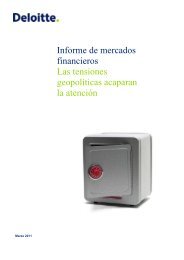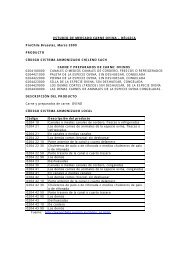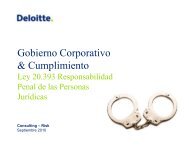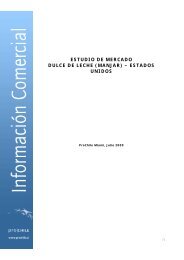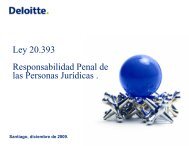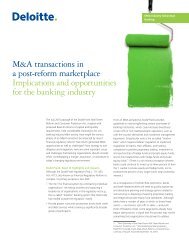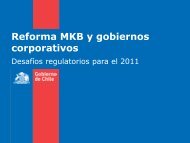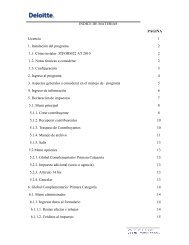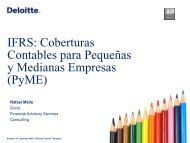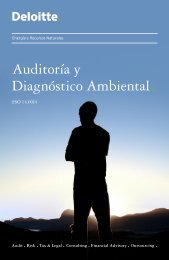Tax Advisers - Deloitte
Tax Advisers - Deloitte
Tax Advisers - Deloitte
Create successful ePaper yourself
Turn your PDF publications into a flip-book with our unique Google optimized e-Paper software.
South Africa<br />
A major advantage of the new ATR system for foreign investors is that non-residents<br />
and non-taxpayers may apply for a Binding Private Ruling. An applicant need not<br />
apply in person, but may use an agent or advisor. In fact, the SARS Guide to the new<br />
ATR system recommends that applicants engage a tax advisor to assist them in their<br />
applications. This is helpful because the pre-qualifying process includes the<br />
requirement that the applicant must make his own draft ruling. Engaging an advisor<br />
would also be helpful in ensuring that the ruling obtained is as wide as possible.<br />
Exclusions<br />
The new ATR System contains both mandatory and discretionary exclusions. Mandatory<br />
exclusions include the following:<br />
• the market value of an asset;<br />
• the application or interpretation of foreign law;<br />
• the pricing of goods or services supplied by or rendered to a connected person in<br />
relation to the applicant;<br />
• the constitutionality of any tax law;<br />
• hypothetical transactions; and<br />
• issues to be listed by the commissioner and the so-called No uling list.<br />
Concerns have been raised by South African taxpayers about the mandatory exclusion<br />
of the pricing of goods and services for transfer pricing purposes. The context is the<br />
absence of an Advance Pricing Agreement system and it is therefore not possible to<br />
negotiate or conclude unilateral, bilateral or multilateral APAs. Although South Africa<br />
has had transfer pricing legislation since 1995, there are no plans to implement an APA<br />
system any time soon.<br />
In addition to the above mandatory exclusions, there is a long list of discretionary<br />
exclusions, which include general and specific anti-avoidance provisions, factual issues,<br />
issues more suitable for Competent Authority procedures, and matters which would<br />
be unduly time-consuming or resource-intensive. All these matters may be excluded<br />
from a Private Binding Ruling at the discretion of the Commission. These<br />
discretionary exclusions have been limited somewhat by a new CFC ruling procedure<br />
(see discussion below).<br />
It is not clear why the No Ruling list is included under Mandatory Exclusions and not<br />
under Discretionary Exclusions because essentially to the Commissioner would use his<br />
discretion to place an issue on the No Ruling list.<br />
All the above exclusions are intended to address concerns about limited resources,<br />
certain basic policy issues and the impossibility of addressing factual issues through the<br />
ATR system. The result, however, is a fairly limited ruling system, especially regarding<br />
the mandatory exclusion of transfer pricing in the absence of an APA system.<br />
Amended CFC rules also introduce new CFC ruling procedure<br />
Certain amendments to the South African CFC rules, passed by Parliament on<br />
November 16 2006, have far reaching consequences for South African outbound<br />
multinationals. The consequences can be restricted to a limited extent by a new CFC<br />
ruling procedure described below.<br />
In a nutshell, the South African taxation of foreign subsidiaries applies as follows: South<br />
African tax resident companies with CFCs – foreign resident companies in which South<br />
African shareholders own more than 50% of the participation rights or control more<br />
than 50% of the vote – are taxed on the income and capital gains of the CFC, unless<br />
specific exclusions apply. The most notable of these exclusions is income attributable to<br />
a so-called business establishment. If a CFC has a business establishment as defined,<br />
income and gains attributable to such a business establishment will not be taxed in the<br />
hands of its South African shareholder.<br />
Prior to the amendments, a business establishment was widely defined as including a<br />
place of business with an office, shop, factory, warehouse or other structure used for<br />
not less than one year which was suitably equipped with on-site operational<br />
management, employees, facilities and other equipment for purposes of conducting<br />
the primary operations of that business.<br />
While it was unclear from the previous definition how many employees constituted a<br />
business establishment, what was clear was that such employees were not required to<br />
182 Guide to the World’s Leading <strong>Tax</strong> <strong>Advisers</strong>




